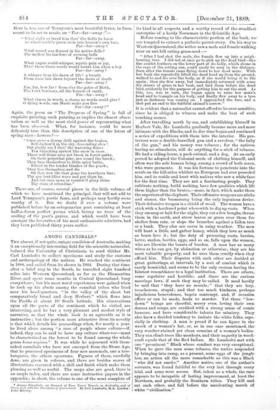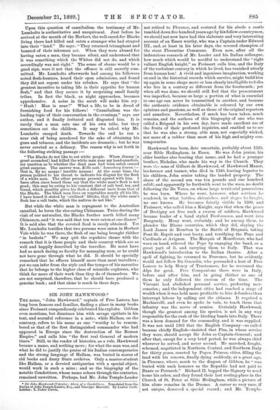AMONG CANNIBALS.*
THE almost, if not quite, unique condition of Australia, making it an exceptionally interesting field for the scientific naturalist, induced the University of Christiania to send thither Mr. Carl Lumholtz to collect specimens and study the customs and anthropology of the natives. He reached the continent in 1880, and sailed from its shores in 1884. During that time, after a brief stay in the South, he travelled eight hundred miles into Western Queensland, as far as the Diamantina River, and spent some months in Central Queensland, busy everywhere ; but.his most novel experiences were gained when he took up his abode among the cannibal tribes who lived near his head-quarters, "in the valley of the short but comparatively broad and deep Herbert," which flows into the Pacific at about 18° South latitude. His observations upon all the parts of the continent which he visited are interesting, and he has a very pleasant and modest style of narrative, so that the whole book is as agreeable as it is instructive ; but the portion most attractive from its novelty is that which details his proceedings when, for nearly a year, he lived alone among "a race of people whose culture—if, indeed, they can be said to have any culture whatever—must be characterised as the lowest to be found among the whole genus homo sapiens." It was while he sojourned with them, naked cannibals who have not emerged from the Stone Age, that he procured specimens-of four new mammals, one a tree- kangaroo, the others opossums. Figures of these, carefully done, are given in colours, and there are besides scores of illustrations executed with a skill and finish which make them pleasing as well as useful. The maps also are good, there is an ample index, and there are some instructive papers in the appendix; in short, the volume is one of the most complete of • Among Cannibals: an Account of Four Years' Travels in Australia, and of Camp Life with the Aborigines of Queensland. By Carl Lumholtz, M.A. London : John Murray.
its kind in all respects, and a worthy record of the steadfast enterprise of a hardy Norseman in the Scientific Age.
Before coming to the characteristic portion of the book, we- ave tempted to extract a pathetic parrot-story. On his way to Western Queensland, the writer saw a male and female walking- near an ant-hill eating grass-seed :— "After I had shot the male, the female flew up into a neigh- bouring tree. I did not at once go to pick up the dead bird—the fine scarlet feathers on the lower part of its belly, which shone in the rays of the setting sun, could easily be seen in the distance. Soon after the female came flying down to her dead mate. With her beak she repeatedly lifted the dead head up from the ground, walked to and fro over the body, as if she would bring it to life, again; then she flew away, but immediately returned with some- dry straws of grass in her beak, and laid them before the dead bird, evidently for the purpose of getting him to eat the seed. As this, too, was in vain, she began again to raise her mate's head and to trample on his body, and finally flew away to a tree just as darkness -was coming on. I approached the tree, and a shot put an end to the faithful animal's sorrow."
It is evident that a naturalist cannot afford to be over-sensitive, since he is obliged to witness and make the best of such touching scenes.
After travelling "north by sea, and establishing himself in Herbert Vale, Mr. Lumholtz gradually became more and more intimate with the Blacks, and in due time began and continued a series of expeditions with them into the interior. His pro- tectors were a double-barrelled gun and a revolver, "the baby of the gun," and his money was tobacco ; for the natives, having no stimulants, will do anything for a stick of tobacco.. He had a riding-horse, a pack-animal, and a dog. At an early period he adopted the Colonial mode of clothing himself, and often was the sole human being, among a crowd of both sexes, who wore garments. It was his fortune to penetrate into the scrub on the hill-sides whither no European had ever preceded' him, and to reside and hunt with natives who saw a white face for the first time. They are not a fascinating people. They
cultivate nothing, build nothing, have few qualities which lift them higher than the brutes,—none, in fact, which make them- the superiors of the elephant. Their offensive weapons are sticks and stones, the boomerang being the only ingenious device. Theirdefensive weapon is a shield of wood. The women haven. stick with a hardened point wherewith to dig uproots, When
they encamp or halt for the night, they cut a few boughs, thrust them in the earth, and strew leaves or grass over them for shelter from rain, or slope the branches against a fallen tree or a bank. They also use caves in rainy weather. The men- will hunt a little, and gather honey, which they love as much as bears love it; but the duty of procuring roots, berries, larvm, snakes, beetles, eggs, and so on, falls upon the women,. who are likewise the beasts of burden. A man has as many wives as he can get, by abduction or otherwise; they are hie- most valuable property, and he uses them cruelly when they offend him. Their disputes with each other are decided at great gatherings, at intervals, by a sorb of combat which is rarely homicidal, and seems to be the only custom having the
faintest resemblance to a legal institution. There are others,_ some repulsive and horrible; and there are the curious-
marriage laws, if such they may be called. It need hardly be said that "they have no morals ; " that they are lazy,.
treacherous, stupid ; and that too much kindness, perhaps injudicious benevolence, begets contempt, and, if occasion offers or can be made, leads to murder. Yet these " low- down " beings are cheerful, merry even, loving their own. dances and songs, are credited with a strong sense of comic humour, and have considerable talents for mimicry. They also have a decided tendency to imitate the white folks, espe- cially in clothing. A man is proud if he can figure in the wreck of a woman's hat, or, as in one case mentioned, the- very weather-stained yet clean remains of a woman's bodice They can climb trees like monkeys, and their sagacity in wood- craft equals that of the Red Indian. Mr. Lumholtz met with. one " prominent " Black whose conduct was very exceptional.
When he gave the man some tobacco, the native responded by bringing into camp, as a present, some eggs of the jungle- hen, an action all the more remarkable as this was a Black "who did not smoke." Another native, one of the author's servants, was found faithful to the very last through every trial, and some were severe. But, taken as a whole, the race- appears to be incapable of lasting improvemenf, at least the Northern, and probably the Southern tribes. They kill an& eat each other, and fall before the unrelenting march of white "civilisation." *Upon this question of cannibalism the testimony of Mr. Lumholtz is authoritative and unequivocal. Just before he arrived at the mouth of the Herbert, the well-cared-for Blacks living there had killed and eaten a stranger who had strayed into their "land." He says : "They returned triumphant and boated of their inhuman act. When they were abused for having eaten a man, they became silent, and understood that it was something which the Whites did not do, and which accordingly was not right." The sense of shame would be a good sign, were it not that the offence is still secretly com- mitted. Mr. Lumholtz afterwards had among his followers noted flesh-hunters, heard their open admissions, and found they did not repent under his rebukes. He says that "the greatest incentive to taking life is their appetite for human flesh," and that they secure it by surprising small family tribes. In fact the black, as night approaches, becomes apprehensive. A noise in the scrub will make him cry : " Hush ! Man is near 1" What a life, to be in dread of furnishing food for his fellows ! "Cannibalism was the leading topic of their conversation in the evenings," says our author, and it finally irritated and disgusted him. It is rarely that a man eats one of his own tribe, but they sometimes eat the children. It may be asked why Mr.
Lumholtz escaped death. Towards the end he ran a near risk of being murdered for the sake of obtaining his guns and tobacco, and the incidents are dramatic ; but he was never coveted as a delicacy. The reason why is set forth in the following striking passage :—
"The Blacks do not like to eat white people. When Jimmy Ca great scoundrel] had killed the white man near my head-quarters, my question as to whether the dead man had been eaten caused great surprise. The answer was, Kale mah ! komorbory kawan !- that is, By no means ! terrible nausea! At the same time, the person pointed to his throat to indicate his disgust for the flesh of a white man. The other persons present agreed with him. I have often since heard them say that the white man's flesh is not good ; this may be owing to his constant diet of salt beef, tea, and bread, which possibly gives his flesh a different taste from that of the Blacks. The black man lives on vegetables nearly all his life. I have heard it stated by civilised' Blacks, that the white man's flesh has a salt taste, which the natives do not like."
But while the white man is repugnant to the Australian cannibal, he loves the rice-eating Chinaman. Twice during the
visit of our naturalist, the Blacks further north killed many Chinamen, and" it was said that ten were eaten at one dinner." It is said also that the coveted food is rarely obtained. Yet Mr. Lumholtz testifies that two persons were eaten in Herbert Vale while he was there, the flesh of one being brought thither "in baskets." We may quit the repulsive theme with the remark that it is these people and their country which are so well and happily described by the traveller. He must have bad as much daring as faculty for managing men, or he could not have gone through what he did. It should be specially remarked that he effaces himself more than most travellers ; yet we can infer from the style and fine temper of his narrative that he belongs to the higher class of scientific explorers, who think far more of their work than they do of themselves. We are not surprised, therefore, that he should have produced a genuine book ; and that alone is much in these days.











































 Previous page
Previous page